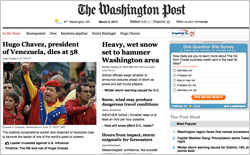 Desperate to find new sources of advertising revenues, major publishers are turning to paid content and native advertising, in essence, allowing
advertising clients to present marketing messages in formats resembling editorial content.
Desperate to find new sources of advertising revenues, major publishers are turning to paid content and native advertising, in essence, allowing
advertising clients to present marketing messages in formats resembling editorial content.
The latest publisher to join the trend is The Washington Post, which unveiled a new
paid-content feature, “Brand Connect,” which includes placement on the “front page” of the newspaper’s Web site.
According to WaPo, marketing
messages delivered via “Brand Connect” benefit from their adjacency to the Web site’s real editorial content.
In a statement about the new product, the publisher describes
Brand Connect as “a platform that connects marketers with The Washington Post audience in a trusted environment.” Each BrandConnect is developed and written by the marketer, it
noted and insists “The Washington Post Newsroom is not involved in the development of BrandConnect content.”
One of the first Brand Connect advertorial features
was from CTIA, the Wireless Association, highlighting the positive impact of mobile communications on rural economies. The text was accompanied by a three-minute video promoting Mobile Main Street, an
app developed by West Virginia University to help towns promote local businesses.
As noted, WaPo is not the first publisher to venture into paid content or native
advertising. Last year, Forbes introduced BrandVoice, which allows marketers to create custom content on the site, including videos. BrandVoice has attracted advertising clients including
Cartier, which sponsored a series of videos highlighting successful entrepreneurs.
Of course, native advertising has its pitfalls. In January, Atlantic Media was roundly criticized
following TheAtlantic Web site’s publication of a “native” ad consisting of Scientology boosterism, in a format that resembled the rest of The Atlantic
site. Links to other articles appearing next to the main article lauded other aspects of Scientology. The Atlantic was also criticized for censoring unfavorable comments from readers
responding to the ad.
advertisement
advertisement